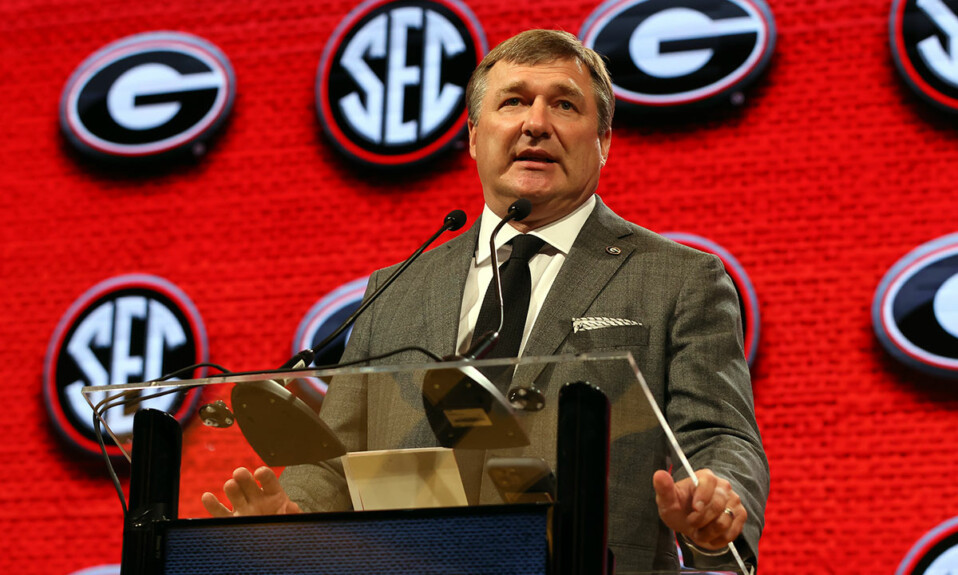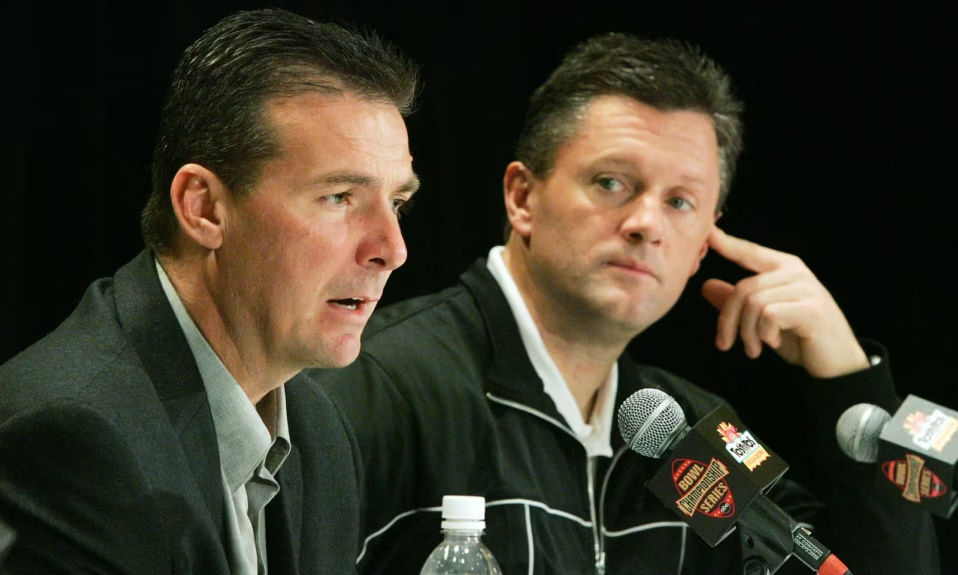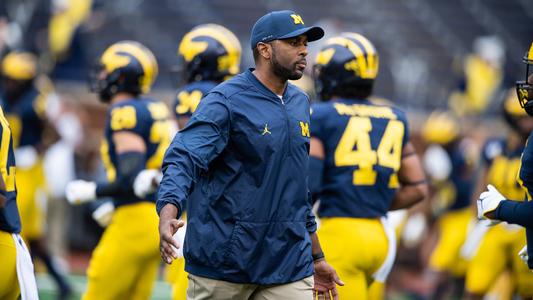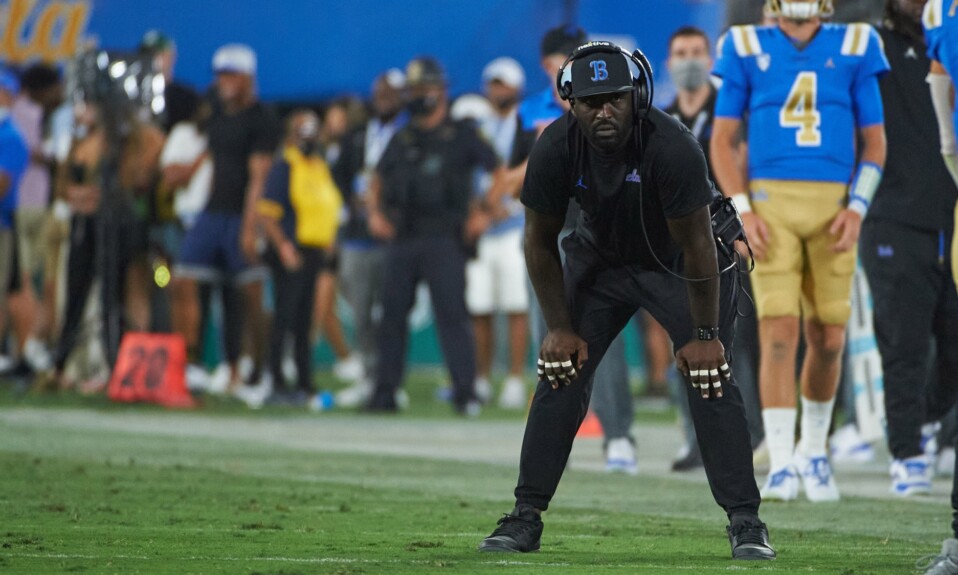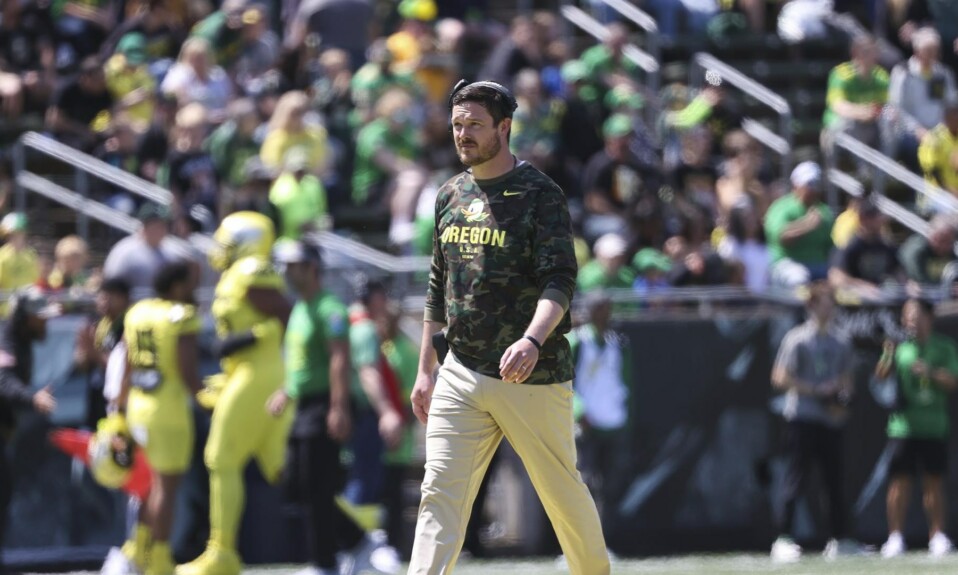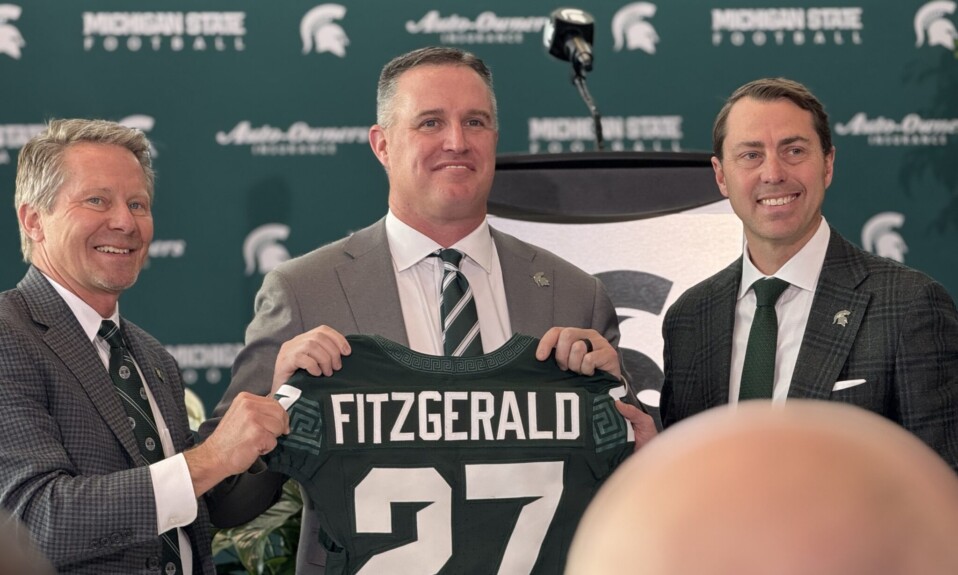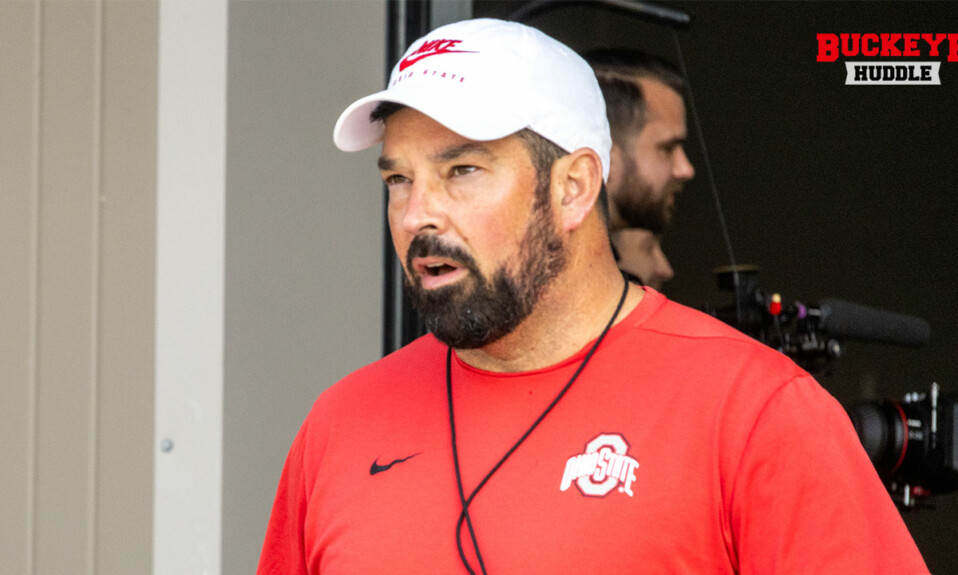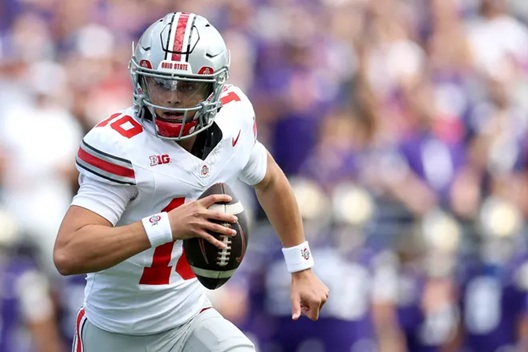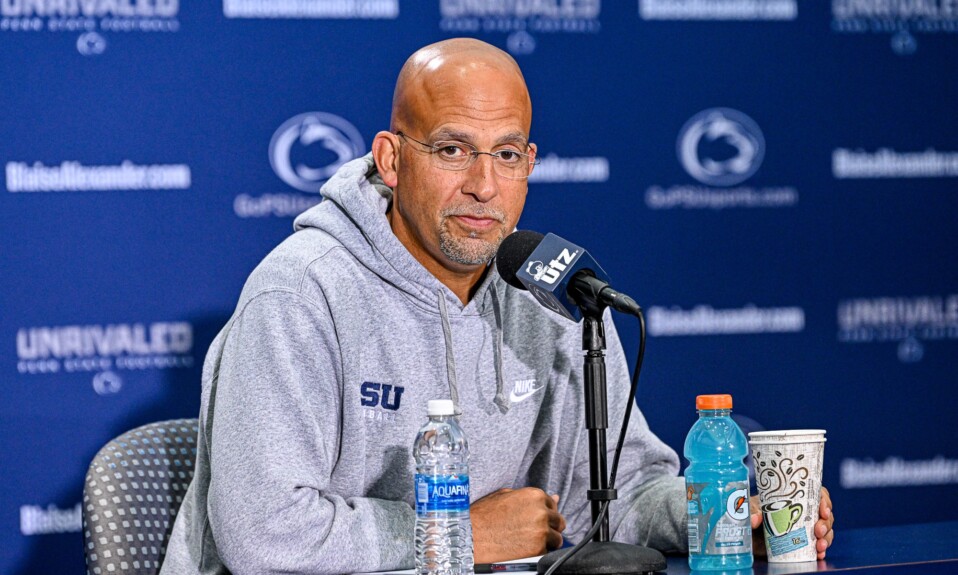The page continues to turn with the latest updates surrounding the alleged Michigan sign stealing saga.
The NCAA launched an investigation into the University of Michigan football program into alleged sign stealing, and the Big Ten Conference released a statement Oct. 19 stating it was notified by the NCAA of the investigation.
PODCAST: Who Should Be on Upset Alert This Weekend?
Athletics director Warde Manuel and the Wolverines athletics department suspended football staff member Connor Stalions with pay on Oct. 20. Stalions was named in an ESPN report as the “person of interest in the investigation into whether No. 2-ranked Michigan violation an NCAA rule by scouting future opponents in person at games,” which has been prohibited since 1994.
According to Pete Thamel of ESPN, Stalions bought tickets to “more than 30 games at 11 Big Ten schools over the past three years,” and “video evidence of sideline taping is expected to be sent to the NCAA this week, caught by stadium surveillance this year.”
According to Marc Givler of Buckeye Huddle, Stalions also “purchased a ticket to a Clemson home football game during the 2022 regular season.” This shows that the scope of the alleged sign stealing extended beyond just the Big Ten.
Thamel also reported that Stalions bought tickets for games among at least four schools outside the Big Ten, including the 2021 and 2022 Southeastern Conference Championship games.
According to Will Hobson of The Washington Post, “an outside investigative firm approached the NCAA with documents and videos the firm said it had obtained from computer drives maintained and accessed by multiple Michigan coaches.”
Furthermore, “Among the pieces of evidence the firm presented, those people said, was a detailed schedule of Michigan’s planned sign-stealing travel for the rest of this season, listing opponents’ schedules, which games Michigan scouts would attend and how much money was budgeted for travel and tickets to scout each team,” according to The Washington Post.
Michigan head coach Jim Harbaugh released a statement Oct. 19, and it can be found below via ESPN.
“I want to make it clear that I, and my staff, will fully cooperate with the investigation into this matter,” Harbaugh stated. “I do not have any knowledge or information regarding the University of Michigan football program illegally stealing signals, nor have I directed any staff member or others to participate in an off-campus scouting assignment. I have no awareness of anyone on our staff having done that or having directed that action. I do not condone or tolerate anyone doing anything illegal or against NCAA rules. No matter what program or organization that I have led throughout my career, my instructions and awareness of how we scout opponents have always been firmly within the rules. Pursuant to NCAA rules, I will not be able to comment further while this investigation takes place.”
According to Thamel on Thursday, NCAA enforcement staff “have been at the University of Michigan this week to look into the sign-stealing probe,” and Thamel posted that it is “an indication of the priority the case has taken.”
What other coaches are saying about sign stealing in college football
Sign stealing is prevalent in football. It happens at levels from youth all the way up to the professional ranks.
Where it can be considered illegal and not part of the game extends beyond traditional methods of scouting.
PODCAST: More big games set the week nine slate
Ohio State head coach Ryan Day said he didn’t want to get into the investigation going on up at Michigan, instead choosing to focus on this week’s game at Wisconsin.
“That’s just something I don’t want to get into right now,” Day said.
But that doesn’t mean other coaches aren’t talking about sign stealing in college football.
Colorado head coach Deion Sanders took an interesting approach when discussing the length and breadth of sign stealing in not just football but baseball, too.
“I mean everyone’s trying to get an edge,” Sanders said. “I mean, everyone’s trying to get whatever edge they can. You could have someone’s whole game plan — they could mail it to you — you still got to stop it. You still got to stop it, so in football it’s not as pronounced as baseball. If I know a curveball is coming, I got you. With football I don’t give a darn if you know a sweep is coming. You still got to stop it. Physically. It’s a physical game. You got to stop it, so that’s a little tough. I don’t buy into a lot of that stuff that someone’s stealing, they’re stealing that. I don’t buy into a lot of that stuff. You still got to play the game.”
Oklahoma head coach Brent Venables said “people are finding all different kinds of ways to prevent it and to try to gain a competitive advantage” when it comes to sign stealing. He said “with tempo and pace” it makes it difficult to decipher opposing signs, and there are individuals with signs shielding them on the sidelines from giving their opponents any sort of leg up.
Venables said he’s sure sign stealing is part of college football, and that means coaches must be proactive.
“I think you’d be naive and negligent if you’re always not aware of the potential,” Venables said. “That’s why, again, from whether it’s year to year or it’s week to week, since I’ve been coaching as long as there’s been signaling where you’re always on both sides of the ball, always changing up your signals and things of that nature. Even the hand signals on the field that the players will do amongst each other.”
READ: Preview Thursday: Week 9
Georgia head coach Kirby Smart also spoke on the topic of sign stealing, and he recalled being with his father scouting opposing teams when he was younger. Here is Smart’s full quote.
“I’ve never heard of anybody going to the games to watch and film and do all that, all the stuff that’s going on, everybody’s talking about,” Smart said. “I don’t know anybody that’s ever done that or I’ve never been asked to do that as a young coach or known anybody to do that. I’ve never heard of that. In high school football, I grew up my dad. We’d go watch other teams play. That was part of what you did. You didn’t watch the other team play. You sat out there with four other coaches and you drew up their plays while they were doing it. That’s pre-cell phone and probably pre-signals because they were sending people in or the coach with send them in with signals. That was a long time ago. But as far as in-game, I think people try to do that. It tries to go on. As a signal caller, when I had to call defenses it confused me if I had to sit there and try to wait on somebody to tell me what they thought they got and I’m trying to think about what the best call for this situation is. And you’re relying on misinformation or something that’s not very reliable. So I don’t, I don’t know. I mean, there’s times that people have said they’ve had our signals in-game and they knew this or that and you talk to the team that you played last and sometimes when you’re not going to play that team again, they share what they might have had on you and things like that so I’ve heard of it in-game. But a lot of times you can know the signal and still not do it right. It’s kind of a joke we have is you know what play is come in and you mess it up, and I’ve laughed with coaches about that before.”
The Bulldogs also recently played Michigan during the College Football Playoff semifinals in the 2021 season. Georgia beat the Wolverines 34-11 during the Orange Bowl, and later went on to win the first of back-to-back national championships.
Smart said he “didn’t notice anything or know anything” prior to the Orange Bowl when his team played Michigan.
“Nobody we talked to warned us or any of that,” Smart said. “I think everybody we play they say, ‘They steal your signals.’ I mean, we play somebody they’re always like they’re great at stealing your signals. But what they’re referencing is different than stealing them. I mean they’re coming and they’re talking about people, someone, coming to film on that’s completely different, but we’ve tried to hide the signals, hold the calls, put signs up, do all that but there’s nothing I remember about the Michigan game that makes me think that.”
Nebraska head coach Matt Rhule has a unique lens into anything related to sign stealing. He spent parts of three seasons as the head coach of the Carolina Panthers in the NFL from 2020-22, and that came after head coaching stops at Temple and Baylor.
Rhule was honest as he could be when discussing sign stealing, even noting that it happens “every game.” But what Rhule wanted to emphasize was the difference between sideline technology in the NFL compared to college football.
Rhule, among other head coaches, wants to see helmet technology installed inside the quarterback’s helmet. Here is Rhule’s full quote.
“Sign stealing happens every game,” Rhule said. “There’s nothing wrong with teams over there looking over trying to steal our signs. There’s nothing wrong with us trying to look at their signs. That’s why you should have mics in the helmets, right? Like all these coaches that vote against it every year, it’s because they don’t want to teach their quarterback. You know, in the NFL the quarterback goes out there with three play calls because if I see the free safety’s foot like that, it might be one-high, I’m going to check to this play, but you get the college and you’re watching the game on a Tuesday night and they got the signal and they’re just calling the play. So it’s what makes college football to me, it’s why they score more points, but it’s also why the kids are less prepared. So that’s why there should be, 100% should be (helmet technology). They could get rid of all the stupid signs on the sidelines and we could get pictures of rock stars and all that stuff and we could just play football the way it was meant to be. You go to a high school game, there’s technology on the sideline. You go to NFL game, there’s technology on the sideline. You go to a college, there’s nothing. It should be that. But that’s sign stealing. I would not carry that over to going and filming someone else’s practices or something like that or filming someone else’s games. That’s completely something different. I’m not saying that that happened. But I think what’s wrong partly in our society right now sometimes as we say someone does something against the rules, and sports need rules, right? Sports need rules to keep competitive balance, and when someone does something against the rules, we say, well, should that really even be a rule? And it is the rule. That’s the rule, right? Like I didn’t get to play with – we don’t get five downs. So but in-game, stealing of signs, when I play against somebody and I know that person has friends on the next staff, I know if they have our signs, they’re having it the next week, that’s all part of the game and you have to do what you do. We should absolutely have technology. But if there’s a rule, the rule should be followed. And I’m not speaking about what’s happening right now because I don’t know what happened. But if that is happening somewhere, it’s completely, completely wrong.”
READ: Reports: Army set to join AAC in 2024
And, similar to Smart, Rhule said he hasn’t heard nor suspected anything regarding the ongoing Michigan sign stealing investigation.
“No one from the Big Ten or NCAA has asked me anything yet, so I’m not going to probably comment on anything like that,” Rhule said. “I would never want to cache to somebody else going through a hard time. I don’t know anything.”
